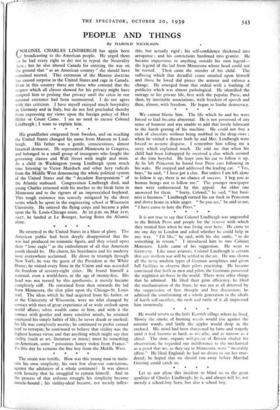* * He returned to the United States in a
blaze of glory. The American public had been deeply disappointed that the war had produced no romantic figure, and they seized upon their "lone eagle" as the embodiment of all that American youth should be. His charm, his boyishness and his modesty were everywhere acclaimed. He drove in triumph through New York; he was the guest of the President at the White House; he visited every State in the Union and was accorded the freedom of seventy-eight cities. He found himself a national, even a world-hero, at the age of twenty-five. His head was not turned by this apotheosis; it merely became completely stiff. He remained from then onwards the lad from Minnesota, the slim pilot upon the Chicago-St. Louis trail. The ideas which he had acquired from his father, or at the University of Wisconsin, were no whit changed by contact with men of great experience of or wide outlook upon world affairs; when wealth came to him, and with it the contact with gentler and more sensitive minds, he retained unaltered his simple habits of life; he never drank or smoked; his life was completely ascetic; he continued to prefer corned beef to terrapin; he continued to believe that virility was the highest human virtue and that anything which might sap that virility (such as art, literature or music) must be something un-American, some "poisonous honey stolen from France." To this day he remains the fine boy from the Middle West.












































 Previous page
Previous page